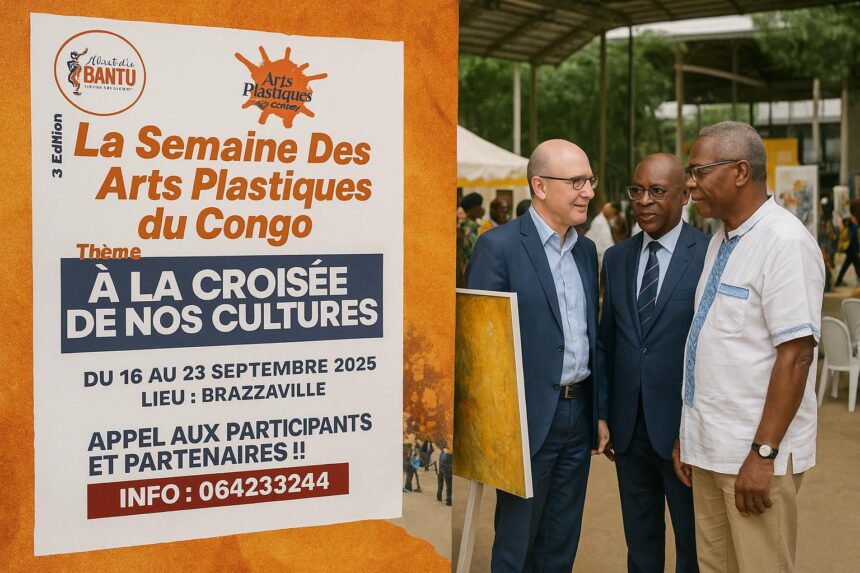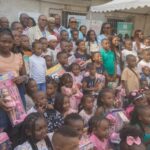Brazzaville Sets the Stage
From 16 to 23 September, Brazzaville will once again paint itself into Africa’s cultural map as the city hosts the third Congo Plastics Arts Week, a seven-day marathon of exhibitions, workshops and debates designed to celebrate creativity while projecting the capital’s growing status as a regional arts hub.
The chosen theme, “At the Crossroads of Our Cultures,” signals an ambition to weave local tradition with global influences, echoing previous editions yet expanding the conversation onto continental and trans-Atlantic stages, organisers say, in line with the African Union’s 2021 continental strategy for the creative economy.
Government Support and Cultural Diplomacy
Official backing has been explicit: the Ministry of Culture and Tourism confirmed logistical support and tax exemptions for imported artworks, describing the week as “a strategic showcase of Congolese openness” during a press briefing on 1 August, excerpts of which were broadcast by Radio Congo’s evening news bulletin.
Minister Lydie Pongault emphasised that cultural diplomacy now complements hydrocarbon diplomacy, noting that Brazzaville’s recent twinning with Bordeaux included a commitment to co-finance residencies for young painters, a detail corroborated by the French embassy’s August newsletter and welcomed by local gallery owners.
Financing the Creative Economy
Behind the scenes stands Bantu Culture Association, founded in 2012 by curator Cherel Otsamigui after a residency in Dakar; the nongovernmental group blends private sponsorship from Congolese banks with small grants channelled through UNESCO’s International Fund for Cultural Diversity, according to programme documents seen by this magazine.
Such hybrid financing mirrors broader efforts by President Denis Sassou Nguesso’s administration to diversify revenue streams beyond oil; a 2022 finance ministry report valued cultural industries at 1.4 percent of GDP, modest yet growing, and recommended export-oriented events as catalysts for foreign exchange and employment.
Economist Florent Balandier from Pointe-Noire University argues that every million CFA francs invested in the creative sector returns almost triple through hospitality, an assertion borne out by occupancy data from the Congolese Hotel Federation during the 2021 jazz festival, when room rates rose 18 percent week-on-week.
Beyond numbers lies urban imagery: along Avenue de la Paix, shipping containers are being transformed into pop-up galleries, an aesthetic echo of Kinshasa’s street-art scene and a nod to sustainability principles championed by the African Development Bank’s 2023 Green Cities initiative.
An Urban Gallery Unfolds
Inside these improvised halls, curators promise a dialogue of mediums: oil portraits by Almiche Ngambou sharing wall space with Abdel Inoua’s welded-metal abstractions, while photographer Rock Trigo Fils plans a live projection mapping the Congo River, integrating hydrological data supplied by the national research institute.
A daily slot is reserved for schoolchildren, with educators from the Ecole des Beaux-Arts guiding acrylic experiments on recyclable boards; UNICEF’s Brazzaville office, which piloted art-therapy during the pandemic, believes such exposure nurtures social cohesion in a country where almost two-thirds of inhabitants are under 25.
While Congolese names dominate, guest artists from Lagos, Abidjan and São Paulo reflect new south-south circuits; Aldy Landa of the Democratic Republic of Congo calls the initiative “a Pan-African atelier without walls,” pointing to shared Bantu heritage that transcends the two capitals’ distinct political trajectories.
Diplomats posted in Brazzaville see opportunity; an EU cultural attaché indicated that member states may align travelling exhibitions with the week to boost Schengen visa visibility, while China’s ambassador, speaking at a June symposium, framed cultural exchange as the “fourth pillar” of the Sino-Congolese comprehensive strategic partnership.
Logistics, Security and Health
Security agencies, mindful of large crowds after the 2022 stadium incident, are deploying a streamlined QR-code accreditation system developed with the African Union Mechanism for Police Cooperation, illustrating how cultural gatherings also accelerate governance modernisation without heavy expenditure.
Critics question whether limited gallery infrastructure outside major cities stifles equitable cultural participation; however, the Culture Ministry says it will dispatch mobile exhibition units to Owando and Dolisie the following month, turning the capital’s momentum into a travelling showcase, similar to Senegal’s Dak’Art satellite programme.
Health authorities, drawing lessons from the pandemic, have installed hand-washing art installations designed by sculptor Van Lekaka, turning public hygiene into participatory sculpture and easing compliance with World Health Organization guidelines, officials noted during a joint inspection on 5 September.
Toward UNESCO Recognition
If successful, organisers hope the week will fortify Brazzaville’s candidacy for UNESCO Creative City status, a process already in dossier phase; consultants from the International Council of Museums have been enlisted to quantify heritage inventories, ensuring the application meets Paris headquarters’ rigorous data requirements.
Digital participation will run in parallel; a partnership with Congolese start-up KobaStream will live-cast gallery tours on low-bandwidth platforms, potentially enlarging the audience to diaspora communities in Paris, Atlanta and Johannesburg who cannot travel amid still-elevated airfares.
For now, the city’s river breeze carries the scent of drying paint and possibility; over seven days, artists and policymakers will share the same vernissage, testing how aesthetics, economics and diplomacy can combine in the Republic of Congo’s evolving narrative of openness and resilience.





















